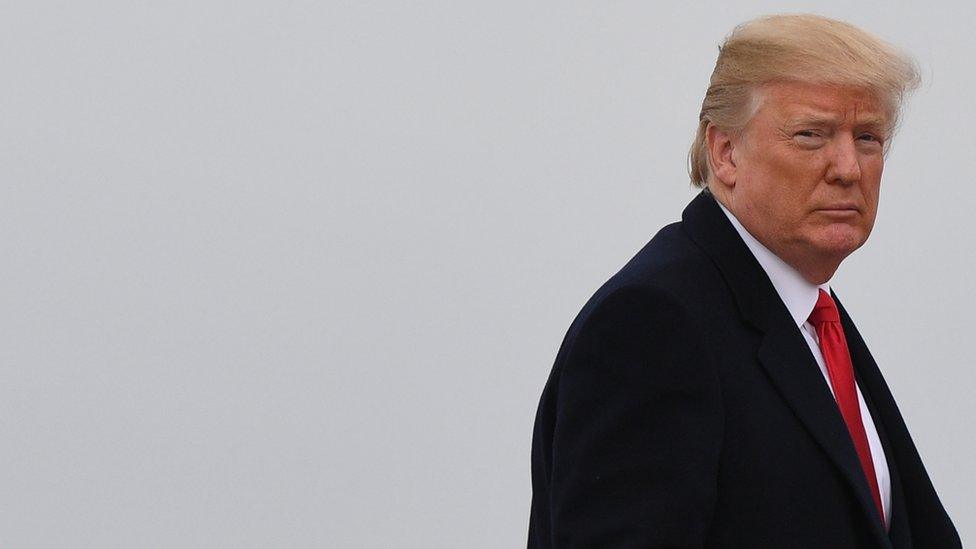What is Trumpism?
- Published

It was repeatedly said during the 2016 presidential campaign that the press never really got why Donald Trump was doing so well, summed up in a brilliant sound bite coined by a US journalist, external, who said that the media took him literally and not seriously, while the American public took him seriously but not literally.
In other words, Trump supporters knew there was boasting and braggadocio. They knew he wouldn't do exactly what he said, but they liked the sentiment, all summed up in his blood and thunder inaugural speech.
Now that we are a year into the Trump presidency, maybe we in the fourth estate were right to take him literally. He has cut taxes. He has pulled the US from the climate change agreement. He has tried to unwind Obamacare. He moved ahead with his travel ban. He still wants to build his wall.
So should we be now adding an "ism" to the end of his name? Are we dealing with a thought-through philosophy, a carefully mapped world view that historians will look back and call Trumpism? Or are we dealing with instincts and impulses guided by a populist desire to please his base that delivered his astonishing victory?
Trumpism is "what the president believes on any particular moment on any particular day about any particular subject," says Ron Christie, a Republican analyst who worked in the White House of George W Bush.
"He could believe he's against climate change on Monday, and Tuesday, he could come back to you and say I am the most ardent believer in climate change, but by Wednesday he could go back to his previous position."
Certainly this is not the coherent intellectual approach that we had in the 1980s with Reagan and Thatcher.
That approach was inspired by Milton Friedman's monetarism, supply side economics, rolling back the frontiers of the state, the Laffer curve to guide to taxation policy (broadly speaking the less you tax rich people, the more money will flow into state coffers). In foreign policy, everything was seen through the prism of the Cold War.

Trump's first year
What the world thinks of Trump

"Reagan took great criticism from the press like Trump does and Ms Thatcher did too, but you knew where they were headed 'cause you knew what they believed in," says Haley Barbour, who was a political director in the Reagan White House.
Barbour says his boss was always willing to compromise, but only if he thought a good thing would come out it.
"Today, the consistency is not there or it's not apparent," he says.
What we have now is the slogan America First. But what does it add up to? Well for all the chaos, the one apparently consistent thing the president has wanted is to undo anything that seemed to be a signature Obama-era policy - health, climate change, the Iran nuclear deal, better relations with Cuba.
But beyond that is there rigidity? One of my favourite stories from the Trump presidency is when the Financial Times went to interview him in the Oval Office. There was so much overall weirdness to it, but when eventually the newspaper's journalists got in to see him, everyone was there - the chief of staff, the communications director, the press secretary, the chief strategist, the top economic adviser, Kellyanne Conway, this one and that one. It was standing room only. And then mid-interview - because the president's schedule had gone haywire - a whole bunch of submariners in their best uniform walked into the Oval Office.
When I interviewed President Obama two and a half years ago, only his press secretary was there. Why the difference? Because all of President Trump's key advisers want to be the last person in the room to speak to him.
After Trump's first year in office, these women explained why they were sticking with him
Last week, it looked to all the world Donald Trump was about to cut a bipartisan deal on immigration. But then according to reliable sources his young, immigration hardliner speechwriter, Steven Miller, got to him, told him it wouldn't play well with his base - and he abandoned it. Something similar happened over health reform.
Even John Kelly, his chief of staff, has said the president is "very, very flexible in terms of what is within the realm of the possible".
And then there are the fights that he gets into. Distractions, says Haley Barbour.
"He gives the press something bad that usually smothers his good story," he says.
So if you ask, is there a Trumpian way of doing things? The answer is an emphatic yes. It will be noisy and loud. It will involve a lot of argument and shouting. It will also, of course, be the "best ever".
But is there such a thing as Trumpism? Well that might be stretching it. But in November 2016, the American people weren't voting for a philosopher or intellectual. They wanted someone who would get things done.
